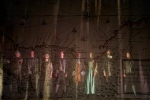As a patriotic Scot, I was incensed by Caledonia, the new national offering from the National Theatre of Scotland, at the Kings Theatre last night.
If the English had produced it there would have been outrage.
The Scots were greedy, arrogant, stupid, vulgar drunkard and sanctimonious to a man. And the women were merely fey and wan attendants.
The aristocrats were fat and lazy, the middle classes were self-serving and the poor were uncouth drunkards (no change there, then). Nobody escaped the self-loathing and false consciousness of this scotching poison pen.
They strutted the stage with melodramatic gestures, sang crude songs, scoffed out of large troughs with arses raised, conquered a swamp and died in their thousands. This could have been written by AA Gill about the Welsh.
In between they sang Brechtian folk songs about how ‘History is written by the Winners’ and ‘Dumbala Dumba’ and the Spanish ambassador claimed that while he was only a quarter Scot,
“I am still not as foolish as the Scots.”
Meanwhile, William Paterson, the founder of the Bank of Scotland and mastermind of the Darien Scheme, stood with visionary foot on bucket like an early day Oor Wullie.
The first joke alluding to the bailed out Royal Bank of Scotland, raised a wry laugh from the audience. “The Bank in whose name all men may trust”.
But by the 15th wise crack, it had grown into a tumbleweed chasm which had swallowed up the production whole.
No wonder the author scurried back to London a week before the World Premiere, and refused to talk to the Press ever since.
It was a cross between Horrible Histories for children, panto …
“Bits of Monty Python, Blackadder and The Muppets but not equalling the sum of those parts,” said Soapyfrogs on Twitter.
Following the law of unintended consequences, we must be grateful for the fact that the Darien Scheme failed since although it was coyly refered to as ‘trade’ it was actually to get a piece of the human flesh action, or slave trade.
After making his fortune in the ‘West Indies’, Paterson certainly had a fair idea of the money was to be made.
Wouldnt it have been more interesting to investigate whether Paterson was a plant by the English? For centuries, the English had warred with their feisty neighbours, but this brilliant scheme was all it took for the Scots to go cap in hand and sue for union with their sworn enemy. Had they not been bankrupted by this scheme, would the Union have taken place?
I feel sorry for Fiona Hyslop, Minister for Culture and External Affairs who blurbs,
“I am delighted we are supporting this new and exciting piece of theatre.”
Really? Methinks an SNP MSP would have told the National Theatre of Scotland tae bolt if she’d actually read the script.
It is the story of how Scotland bankrupted itself then had to get a bail out from England. The price? Independence. Nine years later the two mortal enemies became the United Kingdom of Great Britain in 1707.
The performances were impressive, as panto actors can be, but they did not have enough to get their teeth into. Characters drunk and debauched at the beginning remained drunk and debauched at the end. The sanctimonious Presbyterian preacher, played for laughs by Paul Blair, remained the same.
The only character that went through any developmental arc was William Patterson, played by Paul Higgins, and he was a less than sympathetic character. Greedy, foolish, short-sighted and ambitious, he was portrayed as the villain that lost Scotland’s pride and wealth, much the same as Fred the Shred losing RBS.
(But did he? Really? When the rest of Anglo-Saxon bankerdom did the very same thing because there was an inadequate regulatory framework to reign in the excesses of capitalism? Wasn’t he an easy scapegoat, a smokescreen for the lack of state regulation?)
There was nothing for the audience to get their teeth into emotionally, except for the laughs, buffoonery and slapstick.
By the time the 2nd Act came, and the piece became more serious, the lack of empathy, conflict and compelling plot became exposed and the audience lost its appetite. Polite applause was the reception and a deathly silence on Twitter.
To be fair, the audience loved the humour in the first half but when they realised the jokes were on them, as mocked Scots, the laughter faded rapidly.
Caledonia, written by Alistair Beaton; produced by the National Theatre of Scotland and Edinburgh International Festival and directed by Anthony Neilson
©finwycherley
Related Articles
- Caledonia, King’s Theatre, review (telegraph.co.uk)
- Greed and delusion (bbc.co.uk)
- Caledonia, King’s Theatre (independent.co.uk)
- Caledonia | Edinburgh theatre review (guardian.co.uk)
- Edinburgh Festival 2010: Alistair Beaton – Calamity on the high seas (telegraph.co.uk)
- Alistair Beaton and Anthony Neilson: double trouble (guardian.co.uk)
- Caledonia gives reviewers a ‘hard left’ (guardian.co.uk)
- Response: The National Theatre of Scotland is not hostile to oor mither tongue (guardian.co.uk)
- FT
- The List



